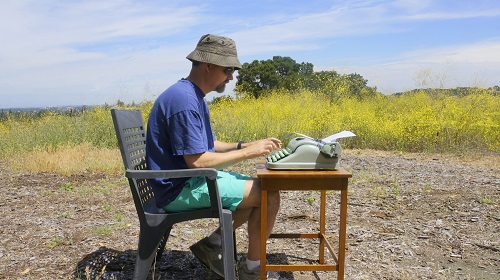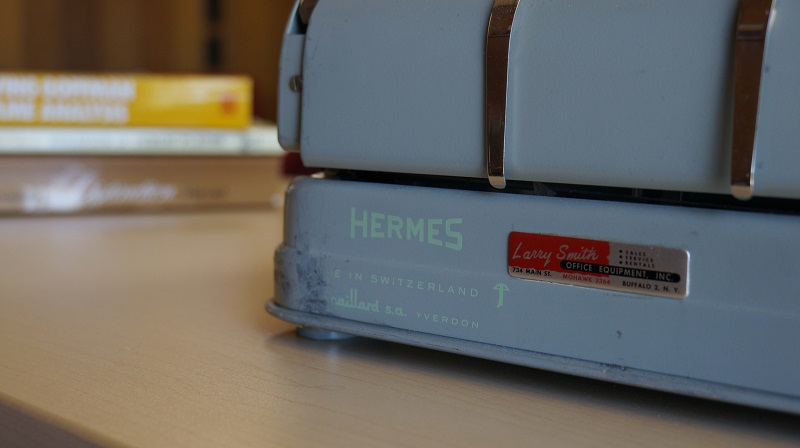
In the photos below you see 2016-17 fellow Zephyr Frank with his CASBS year weapon of choice: a manual typewriter. Why – so he can work in the middle of nowhere, without electricity? So he can remain impervious to cyber-attacks and power outages? So he can commune with the ghost of Thomas Kuhn, who occupied Frank's study (#30) in 1957-58?
None of the above. We ask, and Zephyr answers, in this Q&A. We dare you not to become a Frank-ophile…
We first should mention that Frank's CASBS year book-in-progress, in which his typewriter plays a role, is Luxury and Vanity: Theater and Society in Nineteenth-Century Rio De Jeneiro. It's a companion of sorts to his book Reading Rio De Jeneiro: Literature and Society in the Nineteenth Century (Stanford Univ. Press, 2016).
CASBS: How many typewriters do you own? If you know makes/models/years of them, even better.
Zephyr Frank: I own four. A 1930s portable Corona, a 1960s manual Royal (actually, to tell the truth, this is now my daughter's), a 1960s electric Smith Corona, and the manual Hermes 3000 I used at CASBS.
C: Why did you select the [Swiss-made] Hermes 3000 for your CASBS study?
ZF: The portable Corona is ancient and the keys are small and somewhat hard to use. My daughter would not lend the Royal, which is in better condition than the Hermes. Thus, it was the Hermes. Plus it is the typewriter featured in Patricia Highsmith's The Talented Mr. Ripley – owned by poor Dickie Greenleaf and ultimately dropped in the bottom of an Italian lake by Tom Ripley.
[Fact check: The Greenleaf character in the Highsmith book uses the Hermes Baby, a model launched in 1935. The Hermes 3000 model was launched in 1958, three years after The Talented Mr. Ripley was published. (We relentlessly pestered Frank for the serial number of his Hermes 3000, to establish the vintage. As it turns-out, he's the proud owner of a 1961 model.) Not to worry, Zephyr: author Larry McMurtry is well known for his use of the Hermes 3000. It’s also among the typewriter models known to have been used by Jack Kerouac (in his latter days) and the late Sam Shepard.]

C: During the academic year did you stick to off-hour usage to avoid bothering CASBS fellows in nearby studies?
ZF: Yes.
C: What functional role do typewriters play for you? I mean, what’s your deal with typewriters?
ZF: My system for taking notes on the books and articles I read runs through three steps. First, as I read, I jot down a few phrases in a notepad and I also indicate key phrases or ideas in pencil on the blank pages that tend to appear at the end of a book. Second, I return to the book anywhere from an hour to a few days later. I look up the phrases and select the most interesting or important ones for transcription. Third, I type full phrases or short passages on 3x5 notecards. Needless to say, this operation takes time. It helps me remember what I have read and provides me with a concise set of notes for reference. These can be shuffled, organized in various ways, and set out in large numbers on a table for further analysis. I do not follow this method with everything I read for my research. I only use it when I am convinced that a book or article is of critical importance. Thus, for instance, I have many notecards relating to Erving Goffman or Roberto Schwarz. Last year's mediocre monograph, not so much... Those notes remain stuck at stage 1. Obviously, the reason for typing is poor handwriting, in spite of the efforts of the nuns at my parochial school.
C: Do typewriters make you feel closer to the 19th century authors and artists you study? Is there a history/romanticism about typewriters that hits a chord with you? Is there a sensory element – look, sound, feel – that gets you? What does all this reveal about your personality?
ZF: I suppose typewriters represent writing and the creative process. My heroes are mostly writers. I imagine many of them writing novels and plays with typewriters. In a way, then, the sound and feel of the typewriter makes me feel closer to them. Not that I claim any great distinction as a writer.
Of course, typewriters were not around for most of the 19th century. So my Brazilian novelists and dramatists would not have used them. Nor, for that matter, would my other heroes: Balzac, Flaubert, Eliot. Truth be told, even in the 20th century, most writers probably couldn't type very well and just handed-off their manuscripts to typists. Sometimes it helps to imagine things freely and not worry too much about it…

C: As a practical matter is it difficult getting the typewriters serviced? Are there still people who service them? Do you have to fix/maintain them yourself if problems arise?
ZF: Fortunately, there is a typewriter repairman still working in Los Altos. He's terrific. His shop is called Los Altos Business Machines. It is a family business that has been around since the 1960s. When he retires, I will be out of luck.
[Editor’s note: The shop owner’s name is John Sansone. Listen to a National Public Radio interview with Sansone here.]
C: There’s a new documentary, California Typewriter, about, well, typewriters and the famous as well as everyday people who use them. It premiers in select theaters on Aug. 18. Think you’ll go see it?
ZF: I’ll probably watch it. Note that Tom Hanks has the same Hermes as mine in the display behind him in the film trailer.
[Fact check: Maybe. We could not corroborate Zephyr’s assertion. However, the typewriter shown up close at 00:06 into the film trailer clearly is a Hanks-owned Hermes 2000, rather than a Hermes 3000.]
ZF: I’ll reserve judgment, but now I fear the film will make my quirky thing a hipster thing.
C: We may have to get a ruling from [2016-17 CASBS fellow] Mark Greif on this. But you realize the fishing hat, shades, and shorts ensemble you’ve got going on, dropped into an unidentified location in the wilderness with a little table, chair, and the Hermes, arguably represents some sort of retro-pseudo-hipsterism, right?
ZF: Yes.

Q&A conducted and edited by Mike Gaetani
